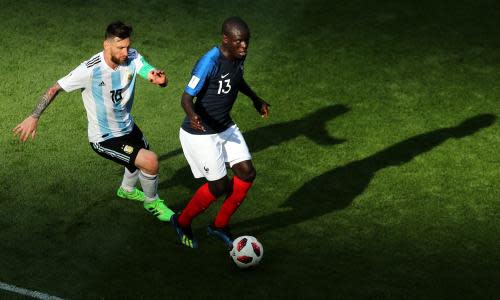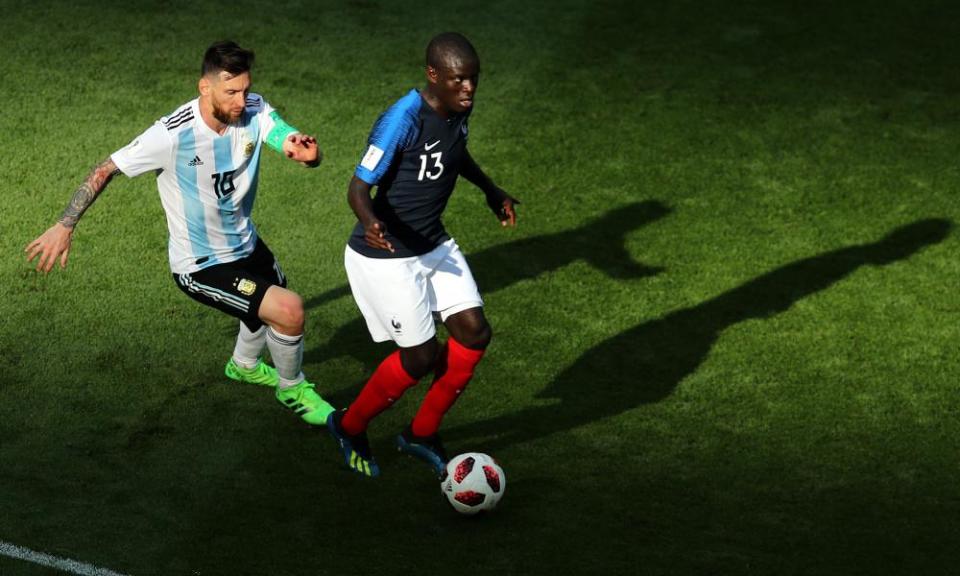Kanté’s class takes centre-stage and outlasts Ronaldo, Messi and co
Henri Langlois would have understood the genius of N’Golo Kanté. Over 60 years ago the founder of the Cinémathèque Française revived interest in the career of an obscure American actress of the silent era with a famous quote: “There is no Garbo! There is no Dietrich! There is only Louise Brooks!”
It was hyperbole, of course. There were lots of other worthwhile things in cinema, just as there are other things in football besides a 5ft 6in midfielder born 27 years ago in a Paris suburb. But more than ever after last Saturday, it is tempting to feel that way about the player in France’s No 13 shirt. There is no Ronaldo! There is no Messi! There is only N’Golo Kanté!
There are qualities about Kanté that speak with a rare clarity of the game at its best and purest, of how humility, altruism, diligence and devotion to the collective cause can survive and prosper even amid the hyperinflated circus of modern sport.
READ MORE: Psychic World Cup octopus killed despite 100 per cent record
READ MORE: Touts sell England tickets for five times face value
READ MORE: Ten things that will happen if England win the World Cup
Something else that Langlois said about Brooks could equally apply, with a few words changed to suit subject and context, to the man who won England’s three major player-of-the-year awards in 2017: “He is the intelligence of the footballing process, the perfect incarnation of all that is football, with complete naturalness and complete simplicity. His art is so pure that it becomes invisible.”
Kanté’s role in France’s resplendent fourth goal on Saturday, the one that broke Argentinian hearts on surely one of the most enthralling days in the history of the World Cup, was typical in its near-invisibility. With the ball at Hugo Lloris’s feet, he made himself available just beyond the edge of the penalty area. Taking possession, he made a couple of steps before releasing the ball to Antoine Griezmann, who was dropping off close to the centre spot. It looked like nothing special, but it was. As always with Kanté, the seemingly straightforward pass was delivered with a pace, a weight and an angle that helped the receiver to decide his next move. From Griezmann the ball flowed swiftly via Blaise Matuidi and Olivier Giroud to the scorer, Kylian Mbappé.
READ MORE: England have the ability to ‘hurt’ any team at the World Cup
READ MORE: The 32: Ray Parlour ‘played for Arsenal while drunk’
READ MORE: Why Croatia stopper wears this t-shirt under his jersey
This aspect of Kanté’s skill – this fundamental relevance – is reminiscent of the great Claude Makelele, his predecessor in the blue of Chelsea and France. But Kanté covers more ground at higher speed and is sharper in the interception. On Saturday, with the stakes at their highest, he kept Lionel Messi as quiet as anyone ever will.
There is also a greater range to his game, something which his ego-free attitude permits him to reveal only sparingly. Five minutes after that fourth goal he dispossessed Ángel Di María deep in his own half, quickly weighed up the situation, and decided that for once the best option was not an instant pass but a 50-metre solo sprint with the ball. When the moment was right, he produced a caviar-laden pass from which Mbappé ought to have completed his hat-trick.
And yet Kanté seems to have nothing to do with the world created by social media. He has no profile, no brand. Although no one could be more committed to the idea of victory and the team, he takes no prominent role in displays of extreme emotion. He is usually on the fringes when a goal is celebrated. He refrains from arguing with officials. (On Saturday he seemed briefly on the brink of making a complaint about something, but thought better of it.)
The intrinsic worth of such a player has nothing to do with the values of the market. Probably only his colleagues appreciate how much he brings. As Zinedine Zidane said in 2003, commenting on Real Madrid’s decision to sell Makelele in order to buy David Beckham: “Why put another layer of gold paint on the Bentley when you’re losing the entire engine?”
Maybe it’s a sign of how far English football has progressed that Kanté is so warmly and widely appreciated. We can be proud that he has flourished in the Premier League, emulating his compatriot Eric Cantona’s feat of winning the title in consecutive seasons with different clubs. What is hard to understand is why, given the opportunity to study the likes of Makelele, Javier Mascherano and Kanté at close quarters, the men who run the FA technical centre at St George’s Park have not set up a special department devoted to helping young English players acquire and refine their priceless attributes.
From the response to the weekend’s matches in Russia, of course, it would appear that, following the departures of Ronaldo and Messi, there is only Mbappé, the 19-year-old who possesses a rare attribute described to me 20 years ago by Gérard Houllier, a former France manager, when discussing another of his nation’s prodigies at the same age: “You can be fast without the ball or, like Nicolas Anelka, fast with the ball.”
In the same conversation Houllier tipped Anelka as a future winner of the Ballon d’Or. That didn’t happen, and Mbappé’s predecessor – another son of the Parisian banlieues – had a troubled relationship with the World Cup. Left out in 1998, 2002 and 2006, he was sent home early from South Africa in 2010 after an altercation with the head coach, Raymond Domenech.
Maybe the comparatively placid Mbappé is destined to become the central figure of this World Cup, just as the original Ronaldo, another player he resembles, was when Brazil recaptured the trophy in 2002. But if he does, he won’t have achieved it without the platform provided by a player who inspires deeper feelings than even the most spectacular solo goal can evoke. For those who cherish the game’s more profound characteristics, N’Golo Kanté is football.



